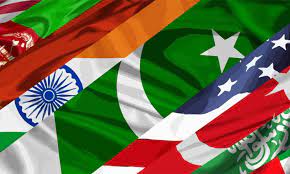Pakistan has its plate full when it comes to playing a productive role in the international affairs.
On the security front, Pakistan’s efforts for peace in Afghanistan, Palestine, and Kashmir, are recognised at regional and international forums. On the diplomatic front, Pakistan had been playing a positive role to connect China with US, Iran with US, and Saudi Arabia with Iran. Pakistan also champions the cause of climate change and has played a significant role in convincing G-20 countries to give debt relief during the ongoing pandemic. Concurrently, Pakistan does not shy away from its responsibilities as an Islamic state to highlight the issues related to Islamobhobia.
Afghanistan has been under occupation since the Soviet troops crossed into on December 24, 1979. Historically, Afghans are averse to external interferences, therefore, they immediately launched a successful struggle, obviously with the help of global community; militarily, morally, and financially. Pakistan, being the immediate neighbour of , had to face the brunt of over three million refugees, which in turn seriously affected its internal security. However, Pakistan did not shy away from its responsibilities of helping a neighbour in its trying moments, and spearheaded the requisite support, perhaps beyond its capacity at times.
Likewise, in the recent Israeli aggression against Palestinians and the sanctity of Al-Quds, Pakistan played a major role alongside Turkey in a diplomatic offensive at the United Nations. Pakistan made concerted efforts to highlight Israeli killings of Palestinian children as gross violations of Human Rights, and therefore, called upon United Nations Human Rights Council (UNHCR) for a special session. Pakistan’s efforts bore fruit when the Organization of Islamic Conference (OIC) led resolution, on the subject, was adopted on 27 May 2021. Pakistan’s initiated and OIC-led resolution was adopted with 24 votes in favour out of 47 members’ council. Pakistan’s diplomatic efforts in the adoption of this resolution against the Israeli atrocities were largely applauded by Muslim countries and would open the gates for open and dispassionate scrutiny on regularly conducted Israeli operations in the Palestinian areas.
On the issue of Kashmir as well, Pakistan continues to call on the international community to take notice of Indian aggression on the peaceful protests by the people of Jammu and Kashmir (J&K) for their rights of self-determination promised to them through numerous UN Resolutions. Pakistan has insisted on the reversal of India’s actions of 5 August 2019, which led to unilateral amendments of India’s Constitution Articles 370 and 35A. The subject articles provided certain autonomy to the people of Kashmir, promised to them at the time joining India. Moreover, it has been done by India in violation to Simla Agreement of 1972, which insists on maintaining status quo on LoC until the issue is amicably resolved.
On the diplomatic front, Pakistan remains active in connecting states for peace and development. Historically, Pakistan provided assistance to US in developing a durable relationship with China at the peak of Cold War. After decades of good politico-economic understanding between US and China, the relationship is turning into a competition for global leadership. Interestingly, Pakistan is expected to take sides, but it has learned the right lessons and made it very clear to the world that its politico-economic future rests with China: a time-tested strategic partner. To highlight the importance of these ties, Pakistan and China are celebrating “70 years of – A Unique Bilateral Partnership” this week. Moreover, successful progression of China-Pakistan Economic Corridor (CPEC) is a manifestation of strong commitment to the strategic partnership by the two nations.
Iran-US relations have been tense since the Iranian revolution of 1979. Incidentally, it coincided with the Soviet’s invasion of Afghanistan. However, in the recent past, Pakistan has been actively playing a bridging role between US and Iran following former President Trump’s decision to break away from the Iran-US nuclear deal.
Likewise, Pakistan has been instrumental in removing historical misunderstandings between Saudi Arabia and Iran. The primary purpose of Pakistan’s diplomatic effort is to bring brother Islamic countries closer to a common understanding of peace and harmony so that the enemies of Islam are unable to draw benefits out of strained relationship between the important regional countries. It is evident through a concerted campaign by the west led by the US against newly elected Iranian President Ebrahim Raisi, who earned over 72 percent of votes to win the elections.
In my opinion, Pakistan’s plate is full as far as its efforts in promoting peace and conflict resolution in the region is concerned and therefore, it is incumbent upon the international organizations responsible for the purpose that its efforts are acknowledged and supported.
Dr Zia Ul Haque Shamsi is the author of the book ‘Nuclear Deterrence and Conflict Management Between India and Pakistan.’ He is presently working as Director, Centre for Aerospace and Security Studies (CASS). This article was first published in Regional Times. He can be reached at cass.thinkers@gmail.com.
Image Source: Mansoor, Aisha. “Pakistan’s Foreign Policy: Is It Improved Now or Was It Better Before?” Khaleej Mag – News and Stories from Around the World. Last modified June 5, 2021




